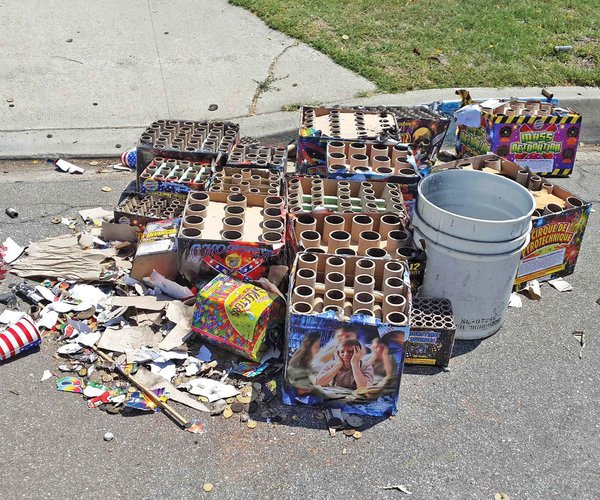Cooking greases that find their way into the Ceres sewer system can clog lines that result in an estimated nine to 14 sewage spills annually. But under a law passed by state lawmakers, the city must develop a plan to curb the amount of greases being dumped into the system and theoretically see less spills.
On Sept. 28 members of the Ceres City Council approved the first reading and introduction of a new ordinance that seeks to stop the problem of greases. The details of the ordinance have yet to be worked out.
FOG (fats, oils and grease) can be a major problem for city sewers. When not disposed of properly, FOG forms thick layers inside sewers and constricts flow - similar to the way cholesterol affects blood flow in human arteries. Clogged sewers can result in backups of customers' pipes that connect to the city's sewer system as well as cause back-ups in the sewer system itself and can lead to sewer overflows onto city streets.
Restaurants and other food handling businesses are a significant source of FOG because of the amount of grease used in cooking and other food preparation work. Residents also often contribute to the problem if they do not properly dispose of the fats, oils and grease they generate.
Details of how the city would reduce fats in the wastewater treatment system will be hammered out at future council study sessions, said Public Works Director Phil Scott.
The new ordinance will be requiring grease interceptors, or grease traps, where possible and set up a permit process for businesses which deal with foods and animal food products. Scott said he envisions the city offering conditional waivers for businesses that are deemed "minimal contributors" to the problem and frequent inspections as long as they paid a "mitigation fee."
The ordinance would take affect next summer.
Councilmen voiced caution about how the city ordinance might affect restaurants which are already struggling in the current economic recession.
"I wouldn't want anyone to go out of business because of what we adopt here," stated Vice Mayor Chris Vierra.
Mayor Anthony Cannella made it clear that the council would hold public hearings to allow affected business owners to provide input.
Ceres resident Len Shepherd said he found it "disturbing" that the council was "putting the cart before the horse" in adopting an ordinance before the plan is fleshed out. He said the ordinance should "spell out every detail" before it's adopted into city law.
"It's not going to be cheap," predicted Shepherd, who said he fears restaurant profitability being hurt.
A cursory check of the internet showed that models of grease traps for restaurants run from $150 to $1,000 depending on model.
Scott replied that the council is only adopting a boilerplate ordinance to indicate to the state that the city is working on the issue. He said the city's intent is not create costs for businesses but to take care of a problem.
Cannella said he could foresee the city having to hire an employee to do enforcement inspections at a cost of $66,000 annually. Scott said those costs could be spread out in different ways, including rolling it into sewer rates citywide.
Ken Holmes of Holmes International, a consultant working with the city on the ordinance, said the city has an unacceptable level of sewer spills and should take steps to reduce the occurrence. He said 75 percent of sewer spills are attributed to fats, oils and grease in municipal lines.
Without reducing fats, the city could be faced with paying fines issued by the state Water Resources Control Board for each incidence of a spill.
The city is asking the public's cooperation by not pouring cooking oil, grease or oil down the sink. Instead it's suggested that such liquids be poured into a closed container and placed in refuse containers.
Scott said education will be key.
"There's a lot of folks who might contribute to FOG," said Scott. "Some of us at home might pour grease down the sink. We will want to educate people, looking at alternative ways to dispose of grease, such as capture it in a coffee can and let it solidify and throw out in the garbage."
He also noted that most smaller restaurants may not need grease traps.
Scott noted that there is a difference between grease traps and grease interceptors. A grease trap is for smaller operations while an interceptor is a larger device of about 1,000 gallons outside in the ground. He said Kentucky Fried Chicken restaurants have them as does the Ceres Community Center.
"Most restaurants in town wouldn't need an interceptor but just follow best management practices," said Scott.
On Sept. 28 members of the Ceres City Council approved the first reading and introduction of a new ordinance that seeks to stop the problem of greases. The details of the ordinance have yet to be worked out.
FOG (fats, oils and grease) can be a major problem for city sewers. When not disposed of properly, FOG forms thick layers inside sewers and constricts flow - similar to the way cholesterol affects blood flow in human arteries. Clogged sewers can result in backups of customers' pipes that connect to the city's sewer system as well as cause back-ups in the sewer system itself and can lead to sewer overflows onto city streets.
Restaurants and other food handling businesses are a significant source of FOG because of the amount of grease used in cooking and other food preparation work. Residents also often contribute to the problem if they do not properly dispose of the fats, oils and grease they generate.
Details of how the city would reduce fats in the wastewater treatment system will be hammered out at future council study sessions, said Public Works Director Phil Scott.
The new ordinance will be requiring grease interceptors, or grease traps, where possible and set up a permit process for businesses which deal with foods and animal food products. Scott said he envisions the city offering conditional waivers for businesses that are deemed "minimal contributors" to the problem and frequent inspections as long as they paid a "mitigation fee."
The ordinance would take affect next summer.
Councilmen voiced caution about how the city ordinance might affect restaurants which are already struggling in the current economic recession.
"I wouldn't want anyone to go out of business because of what we adopt here," stated Vice Mayor Chris Vierra.
Mayor Anthony Cannella made it clear that the council would hold public hearings to allow affected business owners to provide input.
Ceres resident Len Shepherd said he found it "disturbing" that the council was "putting the cart before the horse" in adopting an ordinance before the plan is fleshed out. He said the ordinance should "spell out every detail" before it's adopted into city law.
"It's not going to be cheap," predicted Shepherd, who said he fears restaurant profitability being hurt.
A cursory check of the internet showed that models of grease traps for restaurants run from $150 to $1,000 depending on model.
Scott replied that the council is only adopting a boilerplate ordinance to indicate to the state that the city is working on the issue. He said the city's intent is not create costs for businesses but to take care of a problem.
Cannella said he could foresee the city having to hire an employee to do enforcement inspections at a cost of $66,000 annually. Scott said those costs could be spread out in different ways, including rolling it into sewer rates citywide.
Ken Holmes of Holmes International, a consultant working with the city on the ordinance, said the city has an unacceptable level of sewer spills and should take steps to reduce the occurrence. He said 75 percent of sewer spills are attributed to fats, oils and grease in municipal lines.
Without reducing fats, the city could be faced with paying fines issued by the state Water Resources Control Board for each incidence of a spill.
The city is asking the public's cooperation by not pouring cooking oil, grease or oil down the sink. Instead it's suggested that such liquids be poured into a closed container and placed in refuse containers.
Scott said education will be key.
"There's a lot of folks who might contribute to FOG," said Scott. "Some of us at home might pour grease down the sink. We will want to educate people, looking at alternative ways to dispose of grease, such as capture it in a coffee can and let it solidify and throw out in the garbage."
He also noted that most smaller restaurants may not need grease traps.
Scott noted that there is a difference between grease traps and grease interceptors. A grease trap is for smaller operations while an interceptor is a larger device of about 1,000 gallons outside in the ground. He said Kentucky Fried Chicken restaurants have them as does the Ceres Community Center.
"Most restaurants in town wouldn't need an interceptor but just follow best management practices," said Scott.





